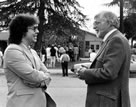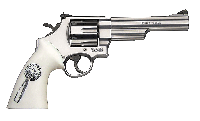
In 1971, moviegoers were introduced to an unorthodox San Francisco detective nicknamed "Dirty Harry" in a film bearing an eponymous title.
 As
portrayed by screen legend Clint Eastwood in an iconographic performance,
the character of Harry Callahan was a no nonsense lawman who frequently
resorted to ruthlessness equal to the criminals he was pursuing.
As
portrayed by screen legend Clint Eastwood in an iconographic performance,
the character of Harry Callahan was a no nonsense lawman who frequently
resorted to ruthlessness equal to the criminals he was pursuing.
The film was a box office sensation, serving as wish fulfillment for audiences tired of reading about real life criminals eluding justice due to some silly little document called the Bill of Rights.
While "Dirty Harry" drew its share of critical praise (Time magazine listed it amongst the best of the year), many reviewers were outraged. One branded the film a "fascist fantasy" while another claimed it glorified "Nietzchean policemen".
Prophetically, the trade paper Variety wrote "Dirty Harry" featured "a superhero whose antics become almost satire."
  |
Alan at 16, Max at 86 |
One person who was laughing was a deranged ten year old who'd snuck into the theater named Alan Spencer.
Having successfully infiltrated the R rated flick, accomplished by purchasing a ticket for the G rated "Fiddler On The Roof" inside the same multiplex, Spencer reveled in the experience.
A devotee of the TV spy spoof "Get Smart!" as well the big screen "Pink Panther" comedies, Spencer found the concept of a crime fighter intentionally causing mayhem and destruction, as opposed to Maxwell Smart's or Inspector Clouseau's klutziness, hilarious… even though "Dirty Harry" was categorically a drama.
![]() In
the ensuing years, two more "Dirty Harry" sequels became surefire
hits: "Magnum Force" followed by "The Enforcer".
In
the ensuing years, two more "Dirty Harry" sequels became surefire
hits: "Magnum Force" followed by "The Enforcer".
Of the latter, Janet Maslin observed in Newsweek: "… (Dirty) Harry has begun to look like a trigger-happy fool."
Now sixteen years old, Spencer wrote a screenplay about his own "trigger-happy fool", a police detective with an insane obsession for guns and violence whose motto, meant to elicit confidence, was "Trust me, I know what I'm doing."
The character and screenplay were both christened "Sledge Hammer!"
Although still a teenager, Spencer had already garnered TV writing credits on innocuous sitcoms like "The Facts of Life" and possessed numerous showbiz contacts.
Nevertheless, people around Hollywood read the "Sledge Hammer!" screenplay not sure what to expect from such a jejune author.
The response was unanimous: Everyone was appalled.
Agents and executives didn't know what to make of a script that featured "over the top" violence, albeit satirical, as well as a main character whose love of his weapon bordered on sodomy.
One studio reader wrote in their coverage: "One must seriously wonder about the state of mind of this writer."
Additionally, a William Morris agent claimed the material was "the work of someone with serious mental problems."
 One
of the few people to respond favorably to "Sledge Hammer!" was
Leonard Stern, the esteemed producer of the aforementioned classic "Get
Smart!"
One
of the few people to respond favorably to "Sledge Hammer!" was
Leonard Stern, the esteemed producer of the aforementioned classic "Get
Smart!"
Stern recognized not only the target of the script's satire, necessary for getting the joke… but the profound influence his own "Smart" had on this particular writer.
Nevertheless, nothing happened with the "Sledge Hammer!" script.
Until, eight years later…
Continued >>>
A cop is a one-man zoo with a gun.